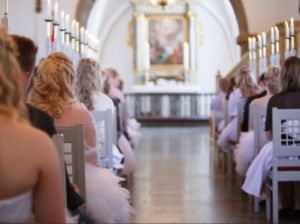Opinion
‘Mere te’ Vicar?: Confirmation’s in the numbers
Darren McCallig
This article is more than 8 years old.

Full house! Must be a confirmation (photo: Aalborg Stift)
The months of April, May and June are, by tradition, the confirmation months in Denmark. All over the country, tens of thousands of young Danes and their families troop into churches to celebrate this milestone in their young lives.
Confirmation in the cake?
For those new to Denmark, it can be quite a shock to see just how elaborate and extravagant these events can be. Some say the celebrations are more like weddings than … well, weddings. After all, the post-ceremony party will typically involve carefully arranged seating plans, lengthy speeches, specially written songs, generous gift-giving and – at the centre of it all – someone in a white dress or a new suit.
Indeed, according to research by Nordea Bank, the average Danish family will invite almost 40 guests to a confirmation dinner and spend over 30,000 kroner on the food, presents and party clothing to celebrate their son or daughter.
There is also a non-religious equivalent of the church ceremony for those who prefer that option. Called a ‘non-firmation’, it basically includes all the quasi-wedding elements listed above – just without the visit to the local parish.
Finally, you could even say that confirmations have a ‘honeymoon’ equivalent. It’s called ‘Blue Monday’ and it’s when the newly-confirmed take a day off school and do their best to spend the cash gifts they have just received on a day’s shopping and entertainment.
A mini United Nations
Here at Saint Alban’s Church we too have celebrated some confirmations in recent weeks.
For us, the truly remarkable thing about this coming-of-age ceremony was the diversity of the candidates. This year we had seven people being confirmed and no two had the same national or cultural background. With roots in Australia, Britain, Denmark, Nigeria, the Netherlands, Uganda and the United States, the group of seven were something of a mini United Nations – topped off by the fact that the visiting bishop was Burmese-Scottish and the priest is Irish!
Being in a position to affirm and celebrate such wonderful diversity is something we are very proud of at Saint Alban’s. With almost 30 different nationalities represented in the pews Sunday by Sunday, we are striving to build meaningful community not simply with those who are most like us, but with everyone who walks through the open doors of the church.
In a world where suspicion and fear of the ‘other’ appears to be on the increase, such a witness to hospitality and inclusion is needed more than ever..
A common affirmation
In fact, the newly-confirmed candidates were given exactly such responsibilities by the bishop at the end of the ceremony. In a section of the ritual known as ‘the Commission’, the group of seven were asked to treat others with respect and to love their neighbours as themselves. They were also given the task of defending the weak and working for peace and justice in the world.
I dare say that all of us – whether confirmed or ‘non-firmed’ – can commit ourselves to those high ideals.

About
Darren McCallig
As the Irish-born vicar of St Alban’s Anglican Church, Darren has a congregation of over two dozen different nationalities (st-albans.dk). Celebrating diversity and building inclusive community are his divine aspirations. And yes – he enjoys a nice cup of tea.










































